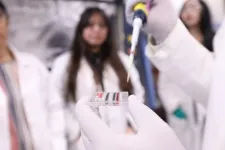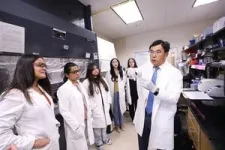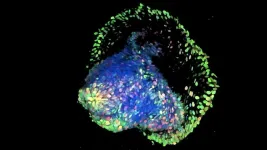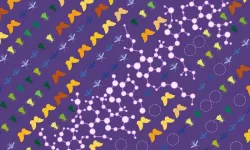(Press-News.org) EL PASO, Texas (Oct. 24, 2024) – Researchers at The University of Texas at El Paso have created a portable device that can detect colorectal and prostate cancer more cheaply and quickly than prevailing methods. The team believes the device may be especially helpful in developing countries, which experience higher cancer mortality rates due in part to barriers to medical diagnosis.
“Our new biochip device is low-cost — just a few dollars — and sensitive, which will make accurate disease diagnosis accessible to anyone, whether rich or poor,” said XiuJun (James) Li, Ph.D., a UTEP professor of chemistry and biochemistry. “It is portable, rapid and eliminates the need for specialized instruments.”
Li is the lead author on a new study describing the device; it’s published in Lab on a Chip, a journal that focuses on micro-scale and nanoscale devices.
Li explained that the most commonly used commercial method of cancer biomarker detection, known as ELISA, requires costly instrumentation to work correctly and can take twelve hours or longer to process a sample. This delay is heightened in rural areas in the U.S. or developing countries, he said, because patient samples must be transported to larger cities with specialized instruments, contributing to a higher rate of cancer mortality.
“If you can detect biomarkers early on, before the cancer spreads, you increase a patients’ chance of survival,” Li said. “Any delays in testing, especially in regions that don’t have access to expensive tools and instruments, can be very bad for a patient’s prognosis.”
The device that Li’s team created is microfluidic, which means that it can perform multiple functions using very small amounts of fluids. The device uses an innovative ‘paper-in-polymer-pond’ structure in which patient blood samples are introduced into tiny wells and onto a special kind of paper. The paper captures cancer protein biomarkers within the blood samples in just a few minutes. The paper subsequently changes color, and the intensity of the color indicates what type of cancer is detected and how far it has progressed.
So far, the research has focused on prostate and colorectal cancers, but Li said the method they devised could be applicable to a wide variety of cancer types.
Li said that the device can analyze a sample in an hour — compared to 16 hours using some traditional methods. According to study results, the device is also about 10 times more sensitive than traditional methods even without using specialized instruments. That means the device can detect cancer biomarkers that are present in smaller quantities, typical of cancer in its early stages. A less sensitive device may not pick up on the smaller quantities, Li said.
Before the device is available to the public, Li said the prototype of the device will need to be finalized and the device tested on patients in a clinical trial, which could take several years. It would require final approval by the Food and Drug Administration before it could be used by physicians.
“Dr. XiuJun Li's innovation significantly improves point-of-care diagnostics by reducing detection times and the need for costly instruments,” said Robert Kirken, dean of the College of Science. “This makes it ideal for resource-limited settings, which will improve early diagnosis and lead to better cancer outcomes. I look forward to seeing what this innovation leads to.”
An additional co-author on the study is Sanjay Timilsina, Ph.D., a former graduate research assistant at UTEP. Li is a member of the Lab on a Chip advisory board.
About The University of Texas at El Paso
The University of Texas at El Paso is America’s leading Hispanic-serving university. Located at the westernmost tip of Texas, where three states and two countries converge along the Rio Grande, 84% of our 25,000 students are Hispanic, and more than half are the first in their families to go to college. UTEP offers 170 bachelor’s, master’s and doctoral degree programs at the only open-access, top-tier research university in America.
END
UTEP researchers develop low-cost device that detects cancer in an hour
Particularly beneficial for rural U.S. areas, developing countries
2024-10-24
ELSE PRESS RELEASES FROM THIS DATE:
Texas A&M physicist Kevin Kelly earns American Physical Society Early Career Award
2024-10-24
Dr. Kevin J. Kelly, an assistant professor in the Department of Physics and Astronomy at Texas A&M University and a member of the George P. and Cynthia Woods Mitchell Institute for Fundamental Physics and Astronomy, has been selected as the 2025 recipient of the American Physical Society’s Henry Primakoff Award for Early-Career Particle Physics in recognition of his contributions and promising career potential in fundamental particle physics and cosmology.
Kelly, who joined the Texas A&M faculty in 2022, works at the interface of two of the biggest outstanding mysteries in particle physics: ...
University of Maryland researcher awarded $1.8 million to study climate change’s impact on people with kidney disease
2024-10-24
Climate change is driving more extreme heat and more air pollution from wildfires, each of which put human health at risk. Now, new research funded by the federal Agency for Healthcare Research and Quality (AHRQ) and led by University of Maryland School of Public Health Professor Dr. Amir Sapkota, will study how these hazards independently and jointly impact already vulnerable groups, such as people living with end stage kidney disease (ESKD). The researchers aim to identify preventative solutions.
“During extreme heat, the damaged kidneys of people with ESKD do not regulate fluid levels very ...
Johns Hopkins Children’s Center research in mice suggests zinc supplements have potential value to directly treat short bowel syndrome
2024-10-24
Researchers from Johns Hopkins Children’s Center say they have identified a gene pathway involving the mineral zinc in mice that may someday point the way to using zinc-based supplements to directly help people with a rare disorder called short bowel syndrome (SBS).
The findings, published Oct. 7 in Nature Communications, help advance efforts toward more effective, potential treatment regimens for both children and adults with the debilitating condition.
SBS, which affects 10,000–20,000 adults and children in the United States, is marked by damage to and shortening of ...
Kalinin receives David Adler Lectureship Award
2024-10-24
Sergei Kalinin, a professor in the Department of Materials Science and Engineering, has been named the winner of the David Adler Lectureship Award in the Field of Materials Physics by the American Physical Society. The award recognizes one outstanding contributor in the field of materials physics who is notable for high-quality research, review articles, and lecturing.
“I am deeply honored to receive the Adler Award, as it recognizes the critical transition in materials discovery that my colleagues at the University of Tennessee and Pacific Northwest National Laboratory and I have championed,” ...
Evaluating the link between chemicals and declining insect populations
2024-10-24
Few people are fans of stink bugs, mosquitoes, or boll weevils, but insects play a key role in the circle of life that makes up the planet’s environment. In fact, world-renowned biologist E. O. Wilson famously declared that if insects vanished, our environment would collapse.
Scientists have noted that insect behaviour has been changing, and their populations are declining – on average 2-3% per year. This has prompted them to investigate the potential causes of this change, such as habitat loss due to overdevelopment, climate change, and chemical use.
EMBL researchers and collaborators recently investigated how pesticides, herbicides, ...
Scientists discover molecules that store much of the carbon in space
2024-10-24
A team led by researchers at MIT has discovered that a distant interstellar cloud contains an abundance of pyrene, a type of large, carbon-containing molecule known as a polycyclic aromatic hydrocarbon (PAH).
The discovery of pyrene in this far-off cloud, which is similar to the collection of dust and gas that eventually became our own solar system, suggests that pyrene may have been the source of much of the carbon in our solar system. That hypothesis is also supported by a recent finding that samples returned from the near-Earth asteroid Ryugu contain large quantities of pyrene.
“One of the big questions in ...
Sublethal agrochemical exposure disrupts insect behavior and long-term survivability
2024-10-24
Even at concentrations too low to kill, exposure to widely used agrochemicals – pesticides, herbicides, and fungicides, among others – has pervasive negative impacts on insect behavior and physiology, researchers report. The findings highlight the need for more comprehensive pesticide assessments, focusing not just on lethality but also on unintended long-term ecological harm to safeguard biodiversity. Over the past decade, many reports have highlighted alarming declines in insect ...
Understanding that US wildfires are becoming faster-moving is key to preparedness
2024-10-24
“The modern era of megafires is often defined based on wildfire size,” say Jennifer Balch and colleagues in a new study, “but it should be defined based on how fast fires grow and their consequent societal impacts.” Balch and colleagues report that wildfire growth rates in the U.S. have surged over 250% over the last 2 decades. Although these fast-moving infernos, or “fast fires” – those spreading more than 1,620 hectares in a day – account for only 2.7% of wildfire events from 2001 to 2020, researchers report that they are responsible for 89% of the total structures damaged ...
Model predicts PFAS occurrence in groundwater in the US
2024-10-24
According to a new machine learning-assisted predictive model, as many as 95 million Americans may rely on groundwater containing PFAS for their drinking water supplies before any treatment, researchers report. This raises concerns about unmonitored contamination in domestic and public water supplies. Per- and polyfluoroalkyl substances (PFAS), often called “forever chemicals,“ are highly persistent environmental contaminants linked to adverse environmental and health effects. Used in many consumer products, these organic pollutants have become ubiquitous in the environment and ...
By studying new species of tardigrade, researchers glean insights into radiation tolerance
2024-10-24
Tardigrades, eight-legged microorganisms colloquially known as “water bears,” are the most radiation-tolerant animals on Earth. Now, by studying a newly identified species of tardigrade, researchers have gleaned valuable insights into the animal’s ability to withstand radiation. These findings hold implications for safeguarding human health in extreme environments, such as spaceflight. Roughly 1,500 species of tardigrades have been described. These creatures can endure gamma radiation ...
LAST 30 PRESS RELEASES:
How rice plants tell head from toe during early growth
Scientists design solar-responsive biochar that accelerates environmental cleanup
Construction of a localized immune niche via supramolecular hydrogel vaccine to elicit durable and enhanced immunity against infectious diseases
Deep learning-based discovery of tetrahydrocarbazoles as broad-spectrum antitumor agents and click-activated strategy for targeted cancer therapy
DHL-11, a novel prieurianin-type limonoid isolated from Munronia henryi, targeting IMPDH2 to inhibit triple-negative breast cancer
Discovery of SARS-CoV-2 PLpro inhibitors and RIPK1 inhibitors with synergistic antiviral efficacy in a mouse COVID-19 model
Neg-entropy is the true drug target for chronic diseases
Oxygen-boosted dual-section microneedle patch for enhanced drug penetration and improved photodynamic and anti-inflammatory therapy in psoriasis
Early TB treatment reduced deaths from sepsis among people with HIV
Palmitoylation of Tfr1 enhances platelet ferroptosis and liver injury in heat stroke
Structure-guided design of picomolar-level macrocyclic TRPC5 channel inhibitors with antidepressant activity
Therapeutic drug monitoring of biologics in inflammatory bowel disease: An evidence-based multidisciplinary guidelines
New global review reveals integrating finance, technology, and governance is key to equitable climate action
New study reveals cyanobacteria may help spread antibiotic resistance in estuarine ecosystems
Around the world, children’s cooperative behaviors and norms converge toward community-specific norms in middle childhood, Boston College researchers report
How cultural norms shape childhood development
University of Phoenix research finds AI-integrated coursework strengthens student learning and career skills
Next generation genetics technology developed to counter the rise of antibiotic resistance
Ochsner Health hospitals named Best-in-State 2026
A new window into hemodialysis: How optical sensors could make treatment safer
High-dose therapy had lasting benefits for infants with stroke before or soon after birth
‘Energy efficiency’ key to mountain birds adapting to changing environmental conditions
Scientists now know why ovarian cancer spreads so rapidly in the abdomen
USF Health launches nation’s first fully integrated institute for voice, hearing and swallowing care and research
Why rethinking wellness could help students and teachers thrive
Seabirds ingest large quantities of pollutants, some of which have been banned for decades
When Earth’s magnetic field took its time flipping
Americans prefer to screen for cervical cancer in-clinic vs. at home
Rice lab to help develop bioprinted kidneys as part of ARPA-H PRINT program award
Researchers discover ABCA1 protein’s role in releasing molecular brakes on solid tumor immunotherapy
[Press-News.org] UTEP researchers develop low-cost device that detects cancer in an hourParticularly beneficial for rural U.S. areas, developing countries





